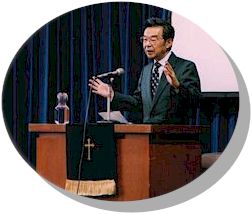|
||
[1 / 4 page] |
||
|
||
| What is the education of children for? | ||
The title of today's lecture, "For whose benefit is education?" seems to be a slightly silly question because it is very evident and can be readily answered. It is, of course, for students. The reason I gave the lecture this title is that while in principle education is supposed to be for the benefit of children, is it perhaps really for the benefit of the parents? What is true education for children and for developing children's humanity? Here, I will give an example which will lead us back to the starting point of education in order for us to try to come up with an answer. |
||
| Self-affirmation | ||
| This is a story about a severely handicapped girl living in Niigata.
She has been disabled from birth, and cannot move around without a wheelchair. She was
deeply affected by the way her body was different from that of other healthy children.
Even though her parents told her to go to the school for handicapped children, she
adamantly refused, saying "If I go out, I will
definitely become the focus of public attention because of my odd appearance."
When she reached about the age of a junior high school student,
a female volunteer worker in her forties came to her house. One day the woman stumbled on
the idea of giving her the tools for painting. Amazingly, she drew a beautiful picture
with dynamic shapes and vivid colors. The woman admired her an excellent work from the
heart, saying, "You can paint incredibly well!"
For the first time since her birth the girl was praised by
others for something she did. Until that day, she had exposed herself to nothing but
compassionate words. For example, her parents kept saying, "We are sorry that it is our fault that you were born with a handicap," and people around her said, "It must be very hard for you." So, the woman's words of praise were the first she had received. Since her first experience with painting, she has become very fond of drawing pictures and drew many excellent pieces. Prodded by the woman to take private painting lessons, she and the woman both started studying with a teacher. The girl greatly improved her skills and became a much better painter. While she was praised by her teacher for her remarkable progress, the woman drew nothing but ordinary, mundane works and didn't improve. This led her to have confidence in herself. Seeing one of her paintings hanging in the corner of a post office, many people praised it. The post office put up her picture in response to the woman's request. Until starting painting, all of her feelings had been taken up by a grudge against others, and she had always reproached others without any reason. Afterwards, she became grateful to her parents for being blessed with a gift for painting, and started undergoing rehabilitation of her own accord. She went so far as to say that she wanted to go to school because it was shameful that she did not know anything about society. She caught up with the other students very quickly despite initially being far behind them. All these things were unthinkable short time ago. Without her encounter with painting, she would have had a bleak life. It completely changed her life. What was the catalyst for all of this? In short, it is "self-affirmation." She confirmed the significance of her existence due to the fact that others acknowledged her ability. I call this the "affirmation of self-existence." It is necessary to confirm the meaning of the "affirmation of self-existence" before we can discuss education for cultivating character. As long as we deny the reality of our existence, we cannot possibly have the desire to be a person who is appreciated by others or God. It is not until we appreciate our own existence and believe our existence is worthy that we try to cultivate our character and to learn things voluntarily. It seems to me that this very basic factor is lacking in current Japanese education. |
||
| My good points | ||
| In the "Vox Populi, Vox Dei" column of The Asahi Shimbun,
there was a story about homework for the students of an elementary school. The students
were told to write an essay on the theme of "my strengths." An objection was raised to the essay's theme among some members of
PTA. They insisted that the theme should be "my
weaknesses" instead of "my strengths" because the
meaning of education was to remedy children's defects. Further, they added that good
points were not worth arguing at all. In fact, students were more responsive to the essay
on the theme of "my weaknesses," and they wrote much, whereas, in case of "my strengths" they wrote
nothing. Children cannot be expected to grow under such circumstances. In the first place,
a person who regards himself or herself as useless with a lot of weaknesses cannot
possibly have the will to be a good person. They find a strong point in themselves, and
others acknowledge it when they develop it further. At this point, they can let their
ability have full play, and then begin to have the desire to be a well-balanced person.
With that in mind, they begin to direct their attention to other points, and want to bring
them up to standard. Not until this stage are they given an incentive to remedy the
weakness. And yet, both parents and teachers are possessed with the idea that the meaning
of education is to remedy children's weaknesses.
Apparently, this is the reason why great educational distortion has been brought to
present-day children. Å@ |
||
|

